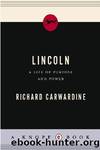Lincoln: A Life of Purpose and Power by Richard Carwardine

Author:Richard Carwardine [Carwardine, Richard]
Language: eng
Format: mobi
Publisher: Knopf Doubleday Publishing Group
Published: 2007-01-08T16:00:00+00:00
Cementing non-Republican northerners and border-state loyalists into the Union coalition would make little difference to the balance of advantage if one or more of the great European powers should throw its resources behind the South. Lincoln had no firsthand knowledge of foreign affairs, but he knew enough to understand that civil wars left nations prey to outside interference. âA nation which endures factious domestic division, is exposed to disrespect abroad,â he told Congress, âand one party, if not both, is sure, sooner or later, to invoke foreign intervention.â90 Lincoln had no intention of involving himself in the day-to-day business of foreign policy: this would be left to his accomplished secretary of state. But he was equally ready to intervene whenever events threatened his larger strategic objective. Ideally, foreign powers should recognize that the Union was involved in putting down an internal insurrection, accept that the Confederate âgovernmentâ was illegitimate, offer the rebels no material or moral support, and respect the blockade of southern ports. But the bottom line was avoidance of war.
The Unionâs key relationship, the administration knew, was with Great Britain, the worldâs greatest naval power. France, too, was a significant force, but was unlikely to take any action independent of Britain. It was, then, alarming that within weeks of the fall of Sumter, on May 14, Lord Palmerstonâs government issued a proclamation of neutrality, recognizing the Confederates as belligerents. Other European powers followed suit. Seward, raging âlike a caged tigerâ and swearing as only he could, saw this as overt encouragement of the rebels.91 For the Europeans, however, it was little more than a conventional response in time of war, falling well short of diplomatic recognition and flowing logically from Lincolnâs blockade of the southern ports, a measure they were ready to recognize. A blockade had status in international law: it was the action of one sovereign power against another and, when effective, it demanded the respect of neutrals. In imposing it, Lincoln undercut his claim that the Union was simply putting down a domestic uprising. A nation could not, after all, blockade itself. After consulting Charles Sumner, who chaired the Senate Foreign Relations Committee, Lincoln set about tempering the militant dispatch which Sewardâin warmongering modeâhad composed for Charles Francis Adams, the United States minister in London. The presidentâs revisions revealed a sharp eye for diplomatic nuance, without yielding the substance of the American position. Lincoln also ordered the urbane Adams to communicate only the substance of the document, and not to read or show it to the British foreign secretary, Lord John Russell.
Simmering resentment continued to mark relations between the two countries for the next six months, boiling into a diplomatic crisis in December over the celebrated Trent affair. The Union navyâs seizure from a British mail packet of two Confederate commissioners bound for diplomatic service in Europe became the occasion of wild, patriotic rejoicing at home and white-hot indignation in Britain. Generally regarded as an ocean bully, long disdainful of neutral rights, Britain now found itself in the unaccustomed role of victim.
Download
This site does not store any files on its server. We only index and link to content provided by other sites. Please contact the content providers to delete copyright contents if any and email us, we'll remove relevant links or contents immediately.
Einstein: His Life and Universe by Walter Isaacson(2011)
Finding Freedom: Harry and Meghan and the Making of a Modern Royal Family by Omid Scobie & Carolyn Durand(1378)
Promised Land (9781524763183) by Obama Barack(1340)
Finding Freedom by Omid Scobie(1291)
Compromised by Peter Strzok(1261)
JFK by Fredrik Logevall(1149)
Freedom by Sebastian Junger(855)
The Russia House by John Le Carré(828)
Salford Lads: The Rise and Fall of Paul Massey by Bernard O'Mahoney(768)
The Irish Buddhist by Alicia Turner(752)
Day of the Dead by Mark Roberts(751)
Kremlin Winter by Robert Service(715)
Graveyard (Ed & Lorraine Warren Book 1) by Ed Warren & Lorraine Warren & Robert David Chase(709)
A World Ablaze by Craig Harline(697)
Joe Biden: American Dreamer by Evan Osnos(678)
Flying Tiger by Samson Jack(664)
100 Things Successful Leaders Do by Nigel Cumberland(645)
Melania and Me: The Rise and Fall of My Friendship With the First Lady by Stephanie Winston Wolkoff(636)
The Mission by David W. Brown(627)
